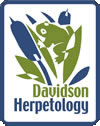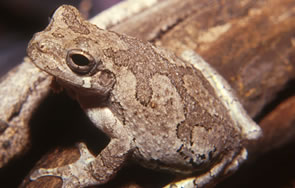
Gray Treefrog
Hyla chrysoscelis and Hyla versicolor
Photo by ME Dorcas
Listed: Hyla versicolor listed as Signicantly Rare by the N.C. Natural Heritage Program.
Description: The Cope’s gray treefrog (Hyla chrysoscelis) and the common gray treefrog (Hyla versicolor) are identical in appearance. Both have somewhat rough, warty skin; a whitish spot under each eye; large toe pads; and bright orange or golden-yellow spots on the underside of each hind leg. In the laboratory, the two species can be distinguished by their chromosomes, with the common gray treefrog having twice as many as the Cope’s gray treefrog. In the field, they can be differentiated by their breeding calls.
Habitats and Habits: Cope’s gray treefrogs are widespread throughout most of North Carolina. Common gray treefrogs have been documented only in Warren and Caswell counties. Individuals of both species are capable of rapid color change; they may be gray, brown, greenish or nearly white. Their color-changing capabilities, along with their rough skin, provide these treefrogs with excellent camouflage when perched on tree branches or bark. Both species descend from trees to breed in many types of ephemeral and permanent aquatic habitats. Eggs are laid at the water’s surface in small masses of 30 or 40, usually attached to vegetation. Tadpoles transform in about six to nine weeks.
Call: Both species call from April to August. Cope’s gray treefrogs have a harsh, rapid trill; common gray treefrogs have a trill that is often slower and more melodic.
Frog Fact: The bright yellow or orange on the underside of each hind leg is believed to startle or confuse predators.
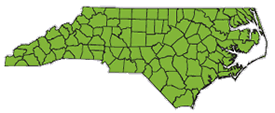
The shaded region represents the range of the Cope's gray treefrog in
North Carolina.
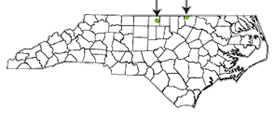
The shaded region represents the range of the common gray treefrog in North Carolina.
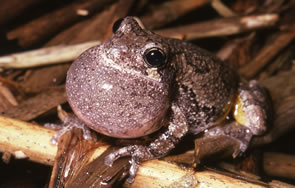
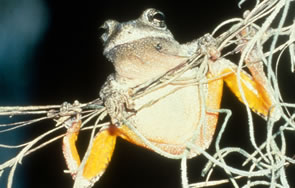
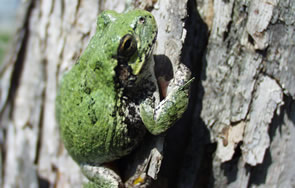
Gray treefrog calling.
Photo by Charlie Eichelberger
Bright yellow coloring under the hind legs is thought to startle predators.
Photo
by Dave Scott
Photo by SJ Price?
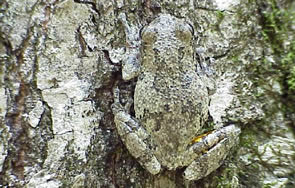
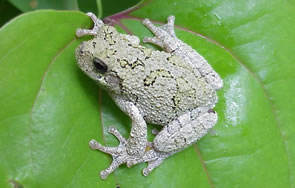
This website created by: Grant Connette and Evan Eskew.
For comments or questions contact M. Dorcas: midorcas@davidson.edu.
M. Dorcas homepage: http://bio.davidson.edu/dorcas
Davidson College, Davidson, North Carolina 28035-1719.
Text and maps from: Dorcas, M. E., S. J. Price, J. C Beane, and S. S. Cross. 2007. The Frogs and Toads of North Carolina. North Carolina Wildlife Resources Commission, Raleigh, NC. – Copyright by Michael E. Dorcas
Calls provided by Dave Ross.
Partial Funding for this website provided by a Associate Colleges of the South, National Science Foundation, and Duke Energy.
